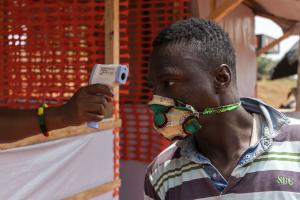Bolstering community approach in Guinea’s Ebola fight
N’Zerekore, Guinea – A few days after he referred a patient from his clinic to the regional hospital, Emmanuel Goepogui, a private practitioner in N’Zerekore prefecture in south-eastern Guinea, received a visit by a community disease surveillance team. “They came to inform me that my patient had tested positive for Ebola and that I was a direct contact,” he says.
“I was then vaccinated along with my family members. After 21 days of follow-up, I was told that I was safe.”
Ebola re-emerged in Guinea on 14 February for the first time since the 2014–2016 outbreak in West Africa. Health authorities along with teams from the World Health Organization (WHO) and partner agencies swiftly set up community disease surveillance system alongside other Ebola prevention and control measures. Tracking the spread of the virus is a key part of curbing the virus: who develops symptoms, where, with whom has the person has been in contact. This helps in quickly detecting cases and isolating their contacts.
With this information, response teams can effectively detect and investigate cases, carry out testing, monitor contacts and vaccinate. Since the outbreak was declared, Guinea had by 2 April recorded 22 cases and 12 deaths, far lower than the previous outbreak which claimed 11 000 lives in Guinea, Liberia and Sierra Leone.
The Ebola response is using a health district approach whereby prevention and control measures pivot around cases. This allows emergency teams to concentrate efforts in an affected locality to curb further spread of the virus. The decentralized response also bolsters the leadership of the local authorities and empowers the health and social service personnel who understand their communities better.
“WHO and other partners are supporting this approach by providing human, financial and material resources to each of the 17 health districts as well as the local health directorate,” says Dr Ibrahima Sory Fofana, WHO Ebola surveillance lead in N'Zerekore.
Each response team comprises a senior epidemiologist, active case-finding personnel, a specialist in communication, infection prevention and control, a psychosocial care expert and community outreach personnel.
The teams go into communities to seek out suspected Ebola cases, which entail any person, alive or dead, presenting or having presented sudden onset of high fever as well as at least three other symptoms of Ebola.
“I have reported an average of 15 suspected cases per day to [Ebola case] investigators,” says Dr Kebe Kalivogui, one of the 43 experts trained in case finding by WHO and Africa Centres for Disease Control and Prevention.
Once suspected cases are reported to Ebola case investigators, “we go into the field to investigate and have confirmation that the case meets the definition of Ebola virus disease. Then we feed the information back to the alert system, which in turn sends a team to further investigate the reported cases," says Dr Faya Nestor Tolno, who is based in Gouecke, a rural community in Nzerekore and the epicentre of the current outbreak.
Facely Conde, who heads the contact-tracing team in Gouecke, organizes visits to monitor people who have been in contact with confirmed Ebola patients. The twice-a-day visits run for 21 days. Nearly 300 contacts have been monitored since the virus re-emerged, 270 cleared after testing negative for Ebola and all active contacts vaccinated.
However, alerts for suspected cases remain low and deaths in communities are not always reported to the health authorities. Fear of being stigmatized or traditional or religious practices sometimes undermine Ebola prevention measures.
Efforts are nonetheless being made to limit Ebola infection. In Nzerekore, a community engagement team worked to overcome hesitance by some community members over the safe and dignified burial of a traditional healer in the first weeks of the outbreak being declared.
Chargé de la communication et de la promotion de la santé
OMS Guinée
Email : konatei [at] who.int (konatei[at]who[dot]int)
Senior Editor/Writer
Email: ottob [at] who.int (ottob[at]who[dot]int)
Communication Officer
Regional Office for Africa
Email: defaitv [at] who.int (defaitv[at]who[dot]int)
